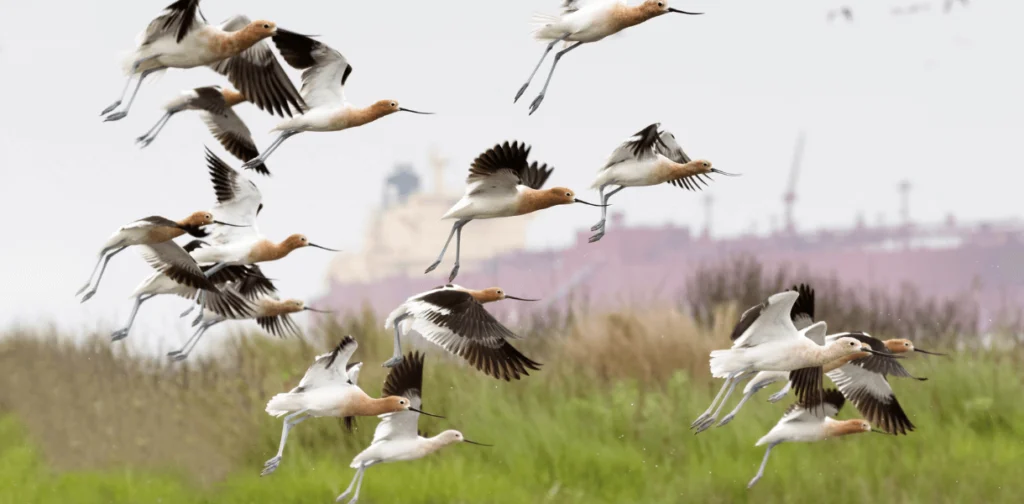American Bird Conservancy (ABC) and Re:wild are proud to announce the inaugural Afrofuturism Collective. The nine members of the Afrofuturism Collective will independently and collectively examine how stories, lifeways, technologies, and concepts from the African diaspora might influence biodiversity conservation and habitat stewardship. Their wide range of lived experiences, creative outputs, and areas of expertise will contribute to the shared work of creating a more ethical, expansive, and effective future for conservation.
Each member of the Afrofuturism Collective will receive an award to carry out an interdisciplinary research project resulting in tool kits, essays, poems, music, and visual art. In addition to their independent work, they will participate in three gatherings to share ideas and sources of inspiration, create connections, and learn from each other. Collective learning, the power of storytelling, and Black thought leadership are at the heart of the group’s work. The Collective’s discoveries, experiences, and creations from this process will help us envision a more ethical future for biodiversity conservation.
“To effectively address species extinction, climate change, and the loss of wild places, we need many creative solutions deriving from varied sources of inspiration, put into practice by people with equally varied backgrounds and perspectives,” said Naamal De Silva, ABC’s Vice President, Together for Birds. “In envisioning the Afrofuturism Collective, I was drawn to the idea of Sankofa, an Akan principle about how ancestral wisdom and history can provide valuable lessons and inspiration for shaping the future; it is especially important to look back when that knowledge is at risk of being forgotten.”
“Nature leads the way with her richness in biodiversity and we need to follow suit with equitable solutions to the environmental crisis. Re:wild is honored to partner with ABC in support of the Afrofuturism Collective,” said Nina Paige Hadley, Re:wild’s Guardians Senior Director. “The members represent the kind of leadership the world needs now — innovation expressed through art and storytelling that courageously speaks to a shared human experience on Earth. This partnership represents Re:wild’s and ABC’s unwavering commitments to forging new ways to work together to ensure that anyone in a position to rewild the planet has agency to do so.”
Meet the Afrofuturism Collective members and learn about their projects below.
Binta Dixon

Binta Dixon is the daughter of Southern Black farmers, Indigenous story weavers, and courageous medicine womxn. Binta earned her Bachelor of Arts in Social Anthropology in 2012, a Graduate Certificate in African and African Diaspora studies in 2013, and her Masters in Public Administration, specializing in nonprofit engagement, from Florida International University. Binta is an Advocacy Coordinator for American Bird Conservancy and a member of the 2024 Viable Paradise Science Fiction Workshop class. A key aspect of Binta’s personal and professional practice is her lifelong study of nature and Afrofuturism.
Project Overview
Binta’s project will create a mixed-media story that weaves the imagination of Black children in the southern U.S. to the wonder and joy found in the world of birds. Utilizing fantasy, science fiction, and Afrofuturist symbolism to root the story in the lived experience of children of the African diaspora, this project will ask: What parallels exist between the lives of birds and the lives of young people growing in the world today? What future is possible that creates solidarity between the thriving of birds and the thriving of children? What could biological adaptations that support our resistance to chemical exposure look like? The project will experiment with ancestral art forms of the African diaspora, African American folktales, audio, text, and emergent strategies for storytelling that leverage technology and sensory-rich materials. In addition to her individual creative project, Binta serves as the coordinator for the Collective and is facilitating three virtual gatherings for members.
Niquole Esters

Niquole Esters is an environmental conservationist who has spent 20 years working across the Asia Pacific, Africa, and Latin America with Conservation International (CI). She served as Director of CI’s Coral Triangle Initiative (CTI) Program, as Senior Director of their Major Gifts Development team, and as the Inclusive Philanthropy Lead. In March 2024, Niquole joined the E.O. Wilson Biodiversity Foundation as the Vice President of Strategic Engagement and is responsible for the organization’s external presence amongst different spaces and places. Niquole received her BA from Washington and Lee University and her MA in Geopolitics, Territory, and Security from King’s College London.
Project Overview
In nearly 20 years of working in conservation and environmental management, Niquole has experienced successful, impactful, and sustainable results when three key factors are in place: 1) a recognition of intersectionality, working within those systems and relationships, 2) a recognition of diversity of experiences and realities, and engaging across those ranges, and 3) the centering of community in approaches — factors that are also inherent in Afrofuturism. Niquole;s project will rely on conversations around the connection between Afro-descendants, nature, and conservation. Using insights from these conversations, Niquole will write an essay on what it means and what it could mean to consider conservation from different Afro-driven and Afrofuturistic perspectives, framing the essay around commonalities and exploring opportunities to move in different directions and spaces.
Wawa Gatheru

In 2019, GenZ climate activist Wawa Gatheru made history as the first Black person to receive the Rhodes, Truman, and Udall scholarships. She holds a BA in Environmental Studies from the University of Connecticut and MS in Environmental Governance from the University of Oxford. She is the founder and Executive Director of Black Girl Environmentalist, the only national organization dedicated to addressing the pipeline and pathway issue for Black girls, women, and gender-expansive individuals in the climate sector. Wawa sits on boards and advisory councils for the Environmental Media Association, Climate Power, Sound Future, National Parks Conservation Association, and Earthjustice. Wawa has been recognized for her work by Glamour, Forbes, Grist, The Root, Harvard T.H. Chan School of Public Health, Yale University. She was featured on the January 2023 digital cover of Vogue alongside Billie Eilish and other climate activists.
Project Overview
After a nearly decade-long music hiatus, Wawa will use these funds to jumpstart the production of a forthcoming album — a musical project that centers around her reflections as a young Black woman navigating the myriad issues plaguing our work and communities. These funds will specifically support Wawa as she writes, produces, and releases a song to inspire hope and a positive outlook amid the climate crisis. The creation and production of this song will take place in Kenya, Wawa’s ancestral home, leaning into Afrobeats production and sound.
Jameka Hodnett

Jameka Jodnett is the Chief Programs Officer for the Chisholm Legacy Project, which connects Black communities on the frontlines of climate justice with resources to traverse the path from vision to action and transformation. She served as the Local Climate Action Policy Fellow with Elemental Excelerator and the African American Mayors Association. Previously, Jameka led a multimillion-dollar climate disinformation campaign for the Climate and Clean Energy Equity Fund, led an organizing team mobilizing 4 million ACLU members to pass legislation, and supported the implementation of D.C.’s Solar for All Program. Jameka has a JD from the University of District of Columbia David A. Clarke School of Law and a BA in International Affairs and Climate Policy from Trinity University.
Project Overview
Jameka will create a guide for implementing Afrofuturist principles and concepts into climate and environmental program strategy and design in environmental organizations, groups, and institutions. Her guide will set out a number of Afrofuturist principles, outline the process for using Afrofuturist principles to set goals and strategies, and provide a sample Afrofuturist action plan. This resource will serve to help infuse imagination, creativity, anti-racism, anti-oppression, and innovation into the environmental movement ecosystem.
Dr. Mel Michelle Lewis
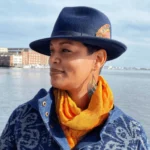
Dr. Mel Michelle Lewis is Vice President, People, Justice, and Cultural Affairs at American Rivers, providing guidance on social and environmental justice initiatives and visioning for the future of clean water for people and nature. Mel is a Collaborator with The Art of Change Agency and serves on the board of Orion Magazine and Greens REALIGN. Mel was an Affiliated Researcher with the Penn Program in Environmental Humanities at the University of Pennsylvania, Associate Professor and Director of the Ecosystems, Sustainability, and Justice Program, co-founder of The Space for Creative Black Imagination: An Interdisciplinary Making and Research Institute, and Chair of the Humanistic Studies Department at the Maryland Institute College of Art. Originally from Bayou la Batre on the Alabama Gulf Coast, their creative work, including their recent book, Biomythography Bayou, explores queer of color nature writing themes and curated images in rural coastal settings.
Project Overview
Mel’s project, “Waterbody” is a transdisciplinary narrative portraiture project that features Gulf South Afrofuturist nature writing, “bayou tableau” ancestral altars, celebrations of Black queer embodied knowledge, and remembrance as ritual. Rooted in the folklore, dialect, foodways, music, art, and natural landscapes of coastal Alabama, Mississippi, and Louisiana, the work imagines the birds of the bayou and other plant and animal relatives as shapeshifters, harbingers, and ancestral apparitions across space-time and generations. Portraiture and poetic writing, paired with altar assemblages, present local and regional Black, Creole, and Indigenous southern religious and spiritual practices, cultural events, and everyday community rhythms through the lens of social and environmental justice. “Waterbody,” is an environmental humanities and liberatory arts project that draws from the well of the past and summons the waves of liberatory Afrofutures.
Lingaire Ofosuhene
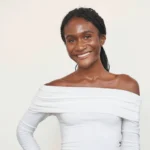
Lingaire Ofosuhene is a recent college graduate with a double major in international relations and narrative studies from the University of Southern California. Hailing from a dual-country African immigrant household, her poetry and visual artwork explore the universality and evolution of storytelling from a cross-cultural perspective. She produced a multimedia performance of her poetry on the flawed nature of motherhood, womanism, and sexuality for an exhibition at the Grammy Museum: Clive Davis Theatre, and received a grant from the Arts & Climate Collective to investigate the interplay between art and sustainability through a three-part painting series which was showcased in collaboration with the Fisher Museum. Lingaire’s background as a computational social science research assistant provides her with transferable skills as she seeks to engage new mediums of technology in tandem with her art.
Project Overview
Lingaire’s project will explore the connection between natural landscapes and individuals’ intimate relationships with their environment. She will draw inspiration from her previous travels from Cape Coast and the forest region to the major cities of Accra and Kumasi, to Apirede, a bustling village in the mountains, and Afienya, a quieter town that doesn’t fit neatly into city or suburb categories. This journey revealed the diverse geography of Ghana and the way people engage with and tend to their environment. Her project will also consider the impact of historical extractive practices and ongoing neocolonial influences, as these factors often shape how people relate to the land. Lingaire plans to create an abstract painting series that represents Ghana’s varied landscapes within a futuristic context, pairing each painting with a piece of prose from the perspective of a narrator in this future world, with their relationship to the land being a central theme.
Jamoni Overby

Environmental justice advocate Jamoni Overby uses her background in policy, project management, and community engagement to focus on issues surrounding water quality, air quality, housing, and intersectional issues that impact Black and brown communities. Jamoni aims to increase access to nature while addressing the climate crisis and its impact on disenfranchised communities. Jamoni has led Nature Forward’s outreach, engagement, education, and advocacy work in the District since 2021 as the D.C. Conservation Advocate. She has led Nature Forward’s successful advocacy efforts on the Healthy Homes For All and 3RC (bottle bill) campaigns, testified at Council hearings, led lobbying days on Capitol Hill, led environmental outreach and engagement programming for District youth, and led the District’s flood preparedness programming in Wards 7 and 8.
Project Overview
Jamoni’s project, “Mother Nature is a Black Woman,” will focus on the parallels between perceptions and understandings of nature and Black women and gender-expansive people. Jamoni will examine cultural, historical, spiritual, and stewardship connections of Black women from across the diaspora to the natural world. Jamoni will explore how representation, resilience, and innovation are important to the climate crisis and the experiences of Black women across the diaspora. She will use nature and the climate crisis to convey a genuine and empowered image of the Black woman’s experience. Jamoni intends to create a video compilation portraying Black women as Mother Nature.
Mykah Scott
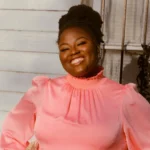
Mykah Scott aspires to combine her passion for arts and advocacy with a career in creative storytelling and public interest. She is a Planet Forward Correspondent and undergraduate at Tuskegee University, where she is studying political science and English. Mykah is from Houston, Texas. She was part of the 2024 Multimedia Storytelling Cohort for Planet Forward and was also a speaker at the 2024 Planet Forward Summit, where she described her visual art project featuring the work of George Washington Carver.
Project Overview
Oral storytelling in the African diaspora has played a crucial role in preserving cultural heritage and providing solace amidst the trials of slavery. Central to this tradition is the Legend of the Flying Africans, which depicts enslaved Africans transforming into birds to return to their homeland. This myth intertwines themes of flight, transformation, and freedom, reflecting a deep connection with nature and a yearning for liberation from the harsh realities of slavery. Through a visual art piece and a poem titled “Why Do I Have Wings?”, Mykah’s project will explore these themes and their connections to ecology, showcasing the enduring relevance of these stories in both historical and contemporary contexts.
Harrison Watson
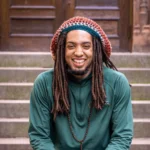
Harrison Watson was one of American Bird Conservancy’s inaugural Conservation and Justice Fellows, working on the Birds and Pesticides Campaign and researching how pesticides like neonicotinoids affect birds and migrant farmworkers. Harrison is a PhD student in ecology at Princeton University, focusing on the role of large herbivore biodiversity in the exchange of carbon between soils and the atmosphere in savanna ecosystems. He is a Public Voices Fellow of the Op-Ed Project and Yale Program for Climate Change Communication as well as a Planet Forward Correspondent. Harrison studied marine biology at Jackson State University, a Historically Black College in Jackson, Mississippi.
Project Overview
Harrison’s project will consist of independent research and reflection an essay, and a poem, all related to Afrofuturist ideas about technology, invisibility, and reclamation. The essay will examine the role of internships and fellowships in developing a new generation of knowledge bearers for the field of conservation. Despite progress made by the conservation field since the uprisings of the summer of 2020, for many aspiring Black conservationists, scientists, and thinkers, a future in the field remains out of reach. Harrison will explore Afrofuturistic themes relating to invisibility and technology to analyze pivotal experiences in his journey into the world of conservation and interactions with some of the leading thinkers and institutions in the field of conservation. Harrison will interview fellows and mentors who guided him through these experiences in an effort to glean insight into the future of the conservation field. Harrison also intends to use poetry to explore relationships with Nature in urban contexts, inspired by his work cultivating an urban pollinator meadow, considering relationships between Black communities and plantations in the city, and considering what conservation will look like in an increasingly urbanized society.
